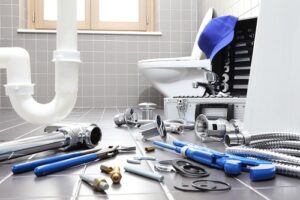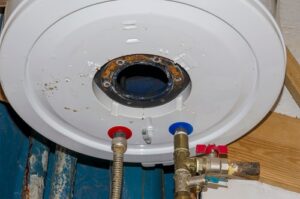Not all plumbers are the same in terms of servicing and knowledge. Many times instead of being a jack of all trades, a professional plumber will choose to focus on one specific area of expertise, or specific types of water systems. Two major areas of focus that many plumbers choose to focus on are residential plumbing systems, and commercial plumbing systems.
While there can be a large degree of overlap between the work done by a commercial plumber and a residential plumber, residential plumbers are going to be working on specific issues to a normal and functioning home environment.
A residential plumber offers a range of services to homeowners, including:
- Installation and repair of various types of pipes including water supply pipes, drain pipes, and gas pipes.
- Installation, repair, and maintenance of water heaters, including tankless water heaters, traditional tank-based heaters, and heat pump water heaters.
- Clearing clogged drains and addressing drainage issues using tools like drain snakes or hydro-jetting equipment.
- Detection and repair of leaks in pipes, faucets, and toilets using methods such as pressure testing and specialized leak detection equipment.
- Handling sewer line services, including repairs, replacements, and inspections.
- Providing routine maintenance services to ensure the proper functioning of the plumbing system, including inspections, cleaning drains, and addressing minor issues.
- Responding to plumbing emergencies such as burst pipes, severe leaks, or overflowing toilets with prompt repairs to prevent further damage.
Installation and Repair of Residential Pipes
Residential plumbers have the expertise to handle the installation, repair, and replacement of different types of pipes within homes, ensuring efficient water supply, proper drainage, and safe operation of plumbing systems.
There are three main types of pipes that a plumber will be handling the installation process for residential homeowners.
Water Supply Pipes: Plumbers install pipes that carry clean water to different fixtures in the house, such as faucets, showers, toilets, and appliances like washing machines or dishwashers. They ensure proper sizing, fitting, and connection of pipes to ensure a reliable water supply throughout the residence.
Drain Pipes: Residential plumbers install drain pipes that carry wastewater and sewage away from the house. These pipes connect to sinks, showers, bathtubs, toilets, and other plumbing fixtures. Proper slope and alignment are crucial to ensure efficient drainage and prevent clogs.
Gas Pipes: Plumbers also install gas pipes for residences that utilize natural gas or propane for appliances like stoves, furnaces, water heaters, or fireplaces. They ensure safe and secure connections, adhering to local codes and regulations for gas line installation.
Installation is not the only major service that plumbers do when it comes to residential pipes. When it comes to a professional plumber, people should be made aware that repair and replacement is also another big aspect of handling residential piping for homeowners. Some of the more common reason for pipe repairs include:
Leak Repairs: When pipes develop leaks due to corrosion, damage, or age, residential plumbers can assess the issue, locate the source of the leak, and perform necessary repairs. They may repair small leaks using methods like pipe patching or sealing, or they may replace sections of damaged pipes if required.
Pipe Replacement: In cases where pipes are extensively damaged, corroded, or beyond repair, plumbers can replace the affected sections or entire pipe systems. This may involve cutting out the damaged portion and installing new pipes, ensuring proper sizing, connections, and sealing.
Burst Pipe Repairs: In emergency situations where pipes have burst due to freezing, excessive pressure, or other causes, residential plumbers respond quickly to address the issue. They will shut off the water supply, assess the extent of the damage, and perform repairs or replacements as necessary to restore the plumbing system.
Pipe Relocation: In some instances, homeowners may require pipes to be relocated due to remodeling, additions, or other reasons. Plumbers can disconnect, reroute, and reinstall pipes to accommodate the new layout or configuration.
Water Heater Installation and Repair
Water heater installation and repair are crucial services provided by residential plumbers to ensure homeowners have access to hot water for various purposes. Most people associate hot water with that of taking a shower, but it is also important to other water appliances in the home such as sinks, clothes washers, and dishwashers.
Water heaters can last for many years without needing to be fixed or replaced, but on average, they tend to last for fifteen years or so depending on the manufacture and the materials used. If a homeowner is noticing their water heater is not working as it once did, they should call a plumber to come out and perform repairs.
Some of the different aspect of water heater repair include:
Troubleshooting: Plumbers are skilled in diagnosing and troubleshooting water heater issues. They inspect the unit, assess the problem, and determine the necessary repairs.
Component Replacement: If a specific component of the water heater malfunctions, such as the heating element, thermostat, pressure relief valve, or gas burner, plumbers can replace the faulty part to restore proper functionality.
Tank Flushing and Maintenance: Over time, sediment buildup can occur inside the tank of a water heater, affecting efficiency and performance. Plumbers can flush the tank to remove sediment and provide routine maintenance to ensure optimal operation.
Leak Repairs: If a water heater develops leaks, plumbers can identify the source of the leak and perform the necessary repairs. This may involve replacing gaskets, seals, or valves, or in some cases, replacing the water heater if the damage is extensive.
Energy Efficiency Upgrades: Plumbers can recommend and install energy-efficient upgrades for water heaters, such as insulation blankets, timer systems, or programmable thermostats, to improve efficiency and reduce energy consumption.
It’s important to note that water heater installation and repair require expertise and knowledge of local plumbing codes and regulations. Hiring a professional residential plumber ensures proper installation, efficient operation, and reliable hot water supply.
Faucet and Toilet Issues
Plumbers are trained to handle various faucet and toilet issues that may arise in residential plumbing systems. Here’s an overview of how they address these problems:
Faucet Issues:
- Leaking Faucets: When a faucet is leaking, plumbers inspect the fixture to identify the cause of the leak. They may need to replace worn-out or damaged components such as washers, O-rings, cartridges, or seals. In some cases, they might recommend replacing the entire faucet if the damage is extensive or if the fixture is outdated.
- Low Water Pressure: Plumbers can investigate and troubleshoot low water pressure in faucets. They check for clogs or obstructions in the aerator or water supply lines. Cleaning or replacing the aerator or removing blockages in the lines can help restore proper water pressure.
- Dripping or Loose Handles: If faucet handles are loose or dripping, plumbers can tighten or repair them by adjusting or replacing the internal components like valve stems or cartridges.
- Installation or Replacement: When homeowners want to install new faucets or replace existing ones, plumbers can handle the entire process. They ensure proper sizing, secure connections, and correct sealing to prevent leaks.
- Toilet Issues:
- Clogged Toilets: Plumbers employ various methods to clear toilet clogs. They may use a plunger or a plumbing auger to dislodge the blockage. In more severe cases, they might use hydro-jetting equipment to remove stubborn obstructions in the drain pipe.
- Running or Leaking Toilets: If a toilet continues to run after flushing or if it leaks water onto the floor, plumbers inspect the internal components of the toilet tank. They can adjust or replace faulty parts such as flapper valves, fill valves, or flush mechanisms to fix the issue.
- Toilet Installation or Replacement: Plumbers handle the installation or replacement of toilets in residential properties. They ensure proper alignment, sealing, and secure connections to the water supply and drainage system. Additionally, they may install wax rings and toilet flanges to create a watertight seal between the toilet and the floor.
- Toilet Tank Condensation: In situations where condensation forms on the outside of the toilet tank, plumbers can install insulation kits or adjust the water temperature to prevent the condensation buildup.
Plumbers have the expertise and tools to effectively diagnose and address a wide range of faucet and toilet issues. They aim to restore proper functionality, prevent leaks, and ensure efficient water usage in residential plumbing systems.
*Disclaimer: The views expressed here are those of the authors and do not necessarily represent or reflect the views of 1st Choice Plumbing*
